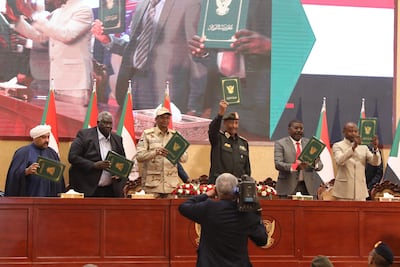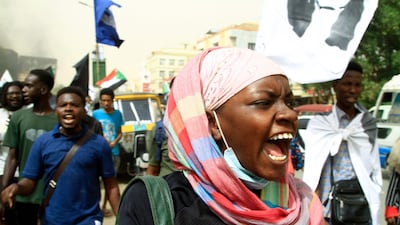Sudan’s journey from military rule to a civilian-led government has had many twists and turns. Reports that a political deal to have been signed on Saturday will instead be concluded on Thursday points to the precarious nature of building a truly representative and effective government in a country confronted by many challenges.
The nation of 46 million people has faced political and economic upheaval since a 2021 military takeover stalled its transition to democracy following the 2019 fall of long-time ruler Omar Al Bashir. Since then, some fitful progress has been made towards building a civilian administration, but there is little time left to waste and the people of Sudan cannot afford more missed opportunities.
The UN’s World Food Programme says an estimated 15 million people in Sudan, including refugees, are experiencing acute food insecurity. About 3 million people have been displaced by conflict or the effects of climate change, with the World Bank saying the country is “exposed to several geophysical and climate-related hazards, some of which are increasing in frequency and magnitude”.
There are also tensions with neighbouring Ethiopia about a long-running border dispute and their differences over a major hydroelectric dam that Addis Ababa has almost finished building on the Blue Nile, an issue in which Egypt is also embroiled.

Finding a political path forward has been difficult, not least because of internal differences between different factions of Sudan’s civilian opposition, with some insisting on a complete and immediate end to the military’s involvement in running the country.
Perhaps most visible among these challenges, however, is what to do with a paramilitary army, 100,000-strong, that although nominally under the control of the armed forces still buys its own weapons, hires foreign military advisers and has its own business interests. The latest delay in reaching an agreement has reportedly centred on differences regarding the timetable for the Rapid Support Forces’ incorporation into Sudan’s military, with the RSF proposing a process stretched over a decade compared with the two years suggested by the army.
The leader of the RSF has spoken of his support for a “single army”, but has yet to unequivocally accept bringing the group under full army command. According to Gen Mohamed Dagalo, the process has to be part of reforms at all state institutions and should not undermine the “special status” of his force.
If Sudan’s civilian and military leaders can bring transparency and oversight to these paramilitaries, it could help Khartoum avoid some of the problems seen in other countries, like Libya, where the use of force often remains outside the exclusive control of the authorities.
Nevertheless, despite the unsteady path to building political stability, Sudan has much to gain by ending the volatility that has plagued it in recent years. It has a young population – about 70 per cent of its people are under 30 – and according to the African Development Bank, the country’s gross domestic product is projected to grow by 4.5 per cent this year, driven by agriculture and mining, as well as by private consumption and investment. Inflation, which has soared for many years, is predicted to fall, and the current account deficit is projected to narrow to 3.9 per cent. Establishing a government with the widespread support of as many Sudanese as possible will only help to cement these gains.
Politically, too, a Sudan at peace with itself could capitalise on new regional partnerships, such as the Abraham Accords that Khartoum has tentatively embraced.
There is reason for optimism. Two weeks ago, Volker Perthes, Special Representative of the UN Secretary General and head of the UN Integrated Transition Assistance Mission in Sudan, told the Security Council that there had been increased participation by women and other stakeholders in the country’s political process, including those who had earlier publicly rejected it. He also referred to “emerging areas of consensus and important breakthroughs”.
This is a momentum that should be built upon. Sudan’s military and political leaders are tantalisingly close to completing an important transition for an important country that is of major significance for Africa and the Arab world. Many Sudanese will be hoping that this is the final leg of that journey.


